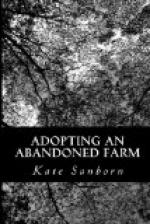The peahen died suddenly and mysteriously. There was no apparent reason for her demise, but the autopsy, which revealed a large and irregular fragment of window glass lodged in her gizzard, proved that she was a victim of Beauty’s vanity. A friend who was present said, as he tenderly held the glass between thumb and finger: “It is now easy to see through the cause of her death; under the circumstances, it would be idle to speak of it as pane-less!” Beauty had never seemed very devoted to her, but he mourned her long and sincerely. Now that she had gone he appreciated her meek adoration, her altruistic devotion.
Another touch like human nature.
And when, after a decent period of mourning, another spouse was secured for him he refused to notice her and wandered solitary and sad to a neighbor’s fields. The new madam was not allowed to share the high roost on the elm. She was obliged to seek a less elevated and airy dormitory. His voice, always distressingly harsh, was now so awful that it was fascinating. The notes seemed cracked by grief or illness. At last, growing feebler, he succumbed to some wasting malady and no longer strutted about in brilliant pre-eminence or came to the piazza calling imperiously for dainties, but rested for hours in some quiet corner. The physician who was called in prescribed for his liver. He showed symptoms of poisoning, and I began to fear that in his visit to a neighbor’s potato fields he had indulged in Paris green, possibly with suicidal intent.
There was something heroic in his way of dying. No moans, no cries; just a dignified endurance. From the western window of the shed chamber where he lay he could see the multitude of fowls below, in the yards where he had so lately reigned supreme. Occasionally, with a heroic effort, he would get on his legs and gaze wistfully on the lively crowd so unmindful of his wretchedness, then sink back exhausted, reminding me of some grand old monarch, statesman, or warrior looking for the last time on the scenes of his former triumphs. I should have named him Socrates. At last he was carried to a cool resting place in the deep grass, covered with pink mosquito netting, and one kind friend after another fanned him and watched over his last moments. After he was really dead, and Tom with tears rolling down his face carried him tenderly away, I woke from my ambitious dream and felt verily guilty of aviscide.
But for my vainglorious ambition Beauty would doubtless be alive and resplendent; his consort, modest hued and devoted, at his side, and my bank account would have a better showing.
There is a motto as follows, “Let him keep peacock to himself,” derived in this way:
When George III had partly recovered from one of his attacks, his ministers got him to read the king’s speech, but he ended every sentence with the word “peacock.”
The minister who drilled him said that “peacock” was an excellent word for ending a sentence, only kings should not let subjects hear it, but should whisper it softly.




